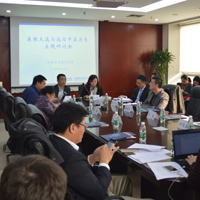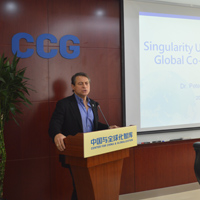- 当前位置:
- 首页>
- 活动>
- ���������������
���������������
CCG持续关注国际关系议题,推动中国与全球化的发展,积极开展国际交流,充分发挥智库“二轨外交”作用,在巴黎和平论坛、达沃斯世界经济论坛、慕尼黑安全会议等重要国际政策与意见交流平台上组织分论坛、边会、圆桌会议、晚宴等活动,促进国际政商学界对话,凝聚共识;CCG积极与各国政界、智库界、工商界开展“二轨外交”活动,每年常态化赴多国调研与交流,促进中外关系攸关方互动,保持与多国政策圈层的沟通渠道。
-

【South China Morning Post】US opposition to AIIB ‘strategic mistake’
A top adviser to US president-elect Donald Trump has lashed out at the Obama administration’s opposition to China’s economic diplomacy, especially the decision to stay away from the Beijing-based Asian Infrastructure Investment Bank.In an opinion piece in the South China Morning Post on Friday, James Woolsey, a senior adviser to Trump on national security and intelligence, called Washington’s spurning of the China-led multilateral lender " strategic mistake" and expected a "muh warmer" response from Trump to President Xi Jinping’s "One Belt, One Road" initiative.The United States and Japan are the only two G7 countries that have not signed up to be AIIB members, a move viewed by Beijing as a sign of Washington’s mistrust of the Chinese government and its ambition to exert bigger-regional influence.Analysts said that if Trump backed US membership of the AIIB and endorsed China’s efforts to revive trade routes along the ancient Silk Road, it would be a big sign of goodwill from Washington to Beijing to pave the way for future agreements.Wang Huiyao, a director at the Centre for China and Globalisation (CCG), a think tank in Beijing, said: "China can invite the United States to join the AIIB after Trump’s inauguration."Wang also said a Trump presidency was not necessarily bad for Sino-US economic ties despite his China-bashing rhetoric on the campaign trail.Former Chinese vice-commerce minister Wei Jianguo agreed, saying that while Trump labelled China a currency manipulator and threatened trade wars, he might have a more open-attitude towards China-backed institutions and investment-programmes.Wei, now a deputy director of the China Centre for International Economic Exchanges, said that if Trump embraced the AIIB, more trade and investment deals could flow between the two economies."There is huge potential for cooperation between China and the US," Wei said.Analysts said Beijing would also be relieved if Trump followed through on a vow to scrap the Trans-Pacific Partnership, a Pacific Rim trade agreement that includes the US, Japan, Australia and Vietnam but not China.The TPP is the economic centrepiece of the Obama administration’s "pivot to Asia" and Beijing sees it as a push to weaken China’s role in the global trade system.Zhang Zhexin, from the Shanghai Institutes for International Studies, said the end of the TPP would expand Beijing’s room to advance its own schemes."If the US is not committed to regional trade deals, China will find a new chance to push forward its own trade deals, bilateral agreements as well as the ‘One Belt, One Road’ strategy," Zhang said. "The US’ economic leadership in the world would be questioned, offering additional room for China to deepen its economic ties with Asia-Pacific countries."Daiwa Capital Markets economists Kevin Lai and Olivia Xia said that if Trump aborted the TPP, China could avoid the risks of "being shut out of a massive trade deal". But it could also delay much-needed reforms in China."Without the threat from the TPP, China could continue to support inefficient state-owned enterprises to strengthen the state control and impose local-content requirements on multinational companies to keep jobs in China," they said.Analysts also warned that competition between the US and China for influence would continue on the economic front.“Even if Trump kills the TPP … it doesn’t mean the US will pull out from Asia,” Liu Weidong, from the Chinese Academy of Social Sciences in Beijing, said.“The US is giving up a particular trade arrangement, but it will not give up its economic interests in Asia.”(By Zhuang Pinghui,Wendy Wu,Kristin Huang)From South China Morning Post, Nov. 11, 2016
2016年11月16日 -
Who is the Likely Forerunner in the WHO Director-General Election?
World Health Organisation Director-General Margaret Chan attends the 69th World Health Assembly at the United Nations European headquarters in Geneva, Switzerland. (Denis Balibouse/Reuters)By Huang Yanzhong , a member of Academic Committee of Center for China and Globalization(CCG) & senior fellow for global health at the Council on Foreign Relations, and his research associate Gabriella Meltzer.With the generous support of the Rockefeller Foundation, the Global Health program at the Council on Foreign Relations hosted a three-part roundtable series, “The Next Director-General of the World Health Organization.” Speakers were invited to discuss topics including the new election procedures, the performance of past WHO director generals, and the skills and qualities needed in the organization’s next leader. Following the convening of this series, we administered an online survey to individuals affiliated with international organizations, nonprofits, foundations, academia, and the private sector, all of whom have expressed interest in attending global health related events hosted by Yanzhong Huang at CFR. The questions in this survey covered the themes addressed in the roundtable series, as we were curious to assess the current opinion climate among those invested in the future of global health. By November 5, 2016, we received fifty responses, among whom a majority (68 percent) were affiliated with NGOs, foundations, think tanks, and academic institutions.Needless to say, the sample size is relatively small and the respondents may not be representative of the entire global health community. But this “straw poll” can be illustrative of the political dynamics surrounding the WHO director-general election. There are currently six candidates nominated by their respective countries. In no particular order, they are the following:▶Tedros Adhanom Ghebreyesus, former foreign affairs and health minister, Ethiopia▶Flavia Bustreo, WHO assistant director-general for family, women’s, and children’s health, Italy▶Philippe Douste-Blazy, former health and foreign minister, France▶David Nabarro, special advisor to Secretary-General Ban Ki-moon on sustainable development, United Kingdom▶Sania Nishtar, former health minister, Pakistan▶Miklós Szócska, former health minister, HungaryWhen asked to rank each of the candidates, the respondents highly favored Dr. David Nabarro. More than one-third of the respondents identified him as their first choice. They commented that he is “qualified and able,” and “has the vision, the consensus building ability, the view from both inside and out, and the technical knowledge required” to succeed in the position, particularly given his wealth of experience within the UN system. Some respondents highlighted the fact that Nabarro’s British nationality may work against him given the argument that the position should rotate geographically. Interestingly, despite their experience in the developing world, neither Nishtar (8 percent) nor Ghebreyesus (15 percent) received particularly high rankings in comparison to Nabarro.It is compelling to note the correlation between the qualities respondents seek in a candidate relative to those they identify with the candidates themselves. A large share of respondents (36 percent) ranked “vision and ability to set direction” as the most important trait, followed by “ability to build consensus” (16 percent) and “ability to take necessary action independently” (15 percent). Respondents deemphasized the value of “technical competence” (14 percent) and “demonstrated skills in managing, investing and raising large multi-billion dollar budgets” (10 percent). Many people’s comments cited Nabarro’s “vision” as the rationale for their choice, and only one mentioned the importance of fundraising capabilities (in the context of Philippe Douste-Blazy), a necessity that has been strongly voiced by Flavia Bustreo. Clearly, those surveyed envision the next director-general as being an inspirational politician, a savvy negotiator, and stalwart advocate for the importance of global health rather than merely a technocrat with substantial public health and financial management experience.The new procedures to elect the WHO director-general introduced this year have generated strong opposition from a number of prominent global health voices. Nearly half (47 percent) of the respondents expressed a moderate or severe lack of confidence in the likelihood that the secret, one-country one-vote system would result in the election of an exemplary leader. It does seem, however, that everyone is looking to the WHO election to produce a strong leader who can guide global health governance into its next phase. When presented with the statement, “Political leaders in member states, especially those from industrialized countries, prefer a WHO director general with weak leadership qualities,” half (50 percent) disagreed, compared with 26 percent who agreed. A large share of those (38 percent) who agreed were aforementioned roundtable attendees. This could indicate more nuanced knowledge of traditional power dynamics, as one commented: “Strong WHO leadership, which could lead to stronger world standards and eventually a stronger focus on emerging economies, could negatively impact the interests of large, Western pharmaceutical and medical companies, which wield strong political weight.”Given the current geopolitical uncertainty that has accompanied waves of populism and isolationism throughout Europe and the United States, the global health community eagerly anticipates Margaret Chan’s successor to navigate the transnational tides of change and sustain the WHO’s leadership in global health governance.From Council on Foreign Relations,2016-11-14
2016年11月16日 -

【People’s Daily Online】Trump’s upsides for China
Donald Trump (Photo/Xinhua)To the surprise of people around the globe, Donald Trump beat Hillary Clinton to win the 2016 U.S. presidential election. Despite certain challenges, opportunities can be found in this upset to improve the China-U.S. relationship, experts pointed out at a seminar held by the Center of China and Globalization (CCG) on Nov. 10 in Beijing.Trump claimed during his campaign that he would designate China as a "currency manipulator," imposing a 45 percent tariff on imported Chinese goods. He has also urged opposition to TPP and globalization.Wang Huiyao, director of CCG, pointed out that Trump’s campaign statements may not all be implemented, or may not be implemented fully, due to practical national and diplomatic concerns. After all, Trump is tasked with representing the will and interests of the entire nation. The main bilateral challenges therefore lie in the uncertainty of U.S. policies going forward, and the negative impact brought about by backtracking globalization.According to Wang, trade is where China and the U.S. share the most common interests. Both countries have achieved tangible benefits through bilateral cooperation in the past. As important participants in and beneficiaries of globalization, both China and the U.S. should firmly support and lead the development of globalization, promoting the inclusive growth of all countries in the world.An Gang, a senior editor and journalist at World Affairs, holds the view that Trump’s promises to cut taxes for enterprises and return manufacturing jobs to the U.S. are likely to pose the most major obstacles for China-U.S. cooperation under his leadership. However, Trump also said he would improve the infrastructure of the U.S., and Chinese companies may have a chance to participate in this effort in the future, according to An.Zhou Xiaojing, former director of the Asia-Africa Development Research Institute under the Development Research Center of China’s State Council, also believes that Trump’s success may bring more favorable than troubling news for China-U.S. relations. However, China should still make preparations and take measures to handle pressure on the RMB exchange rate and China-U.S. trade.From People’s Daily Online, Nov. 11, 2016
2016年11月15日 -

【凤凰网】第三届中国企业全球化论坛即将举办
2015年11月20日,第二届“中国企业全球化论坛”于三亚盛大开幕 第三届中国企业全球化论坛将于12月2-3日在海南开幕,其主题为“中国海外投资驱动力:加速推进,多元并存”。论坛由中国与全球化智库(CCG)、商务部中国国际经济合作学会、海南人民政府和达沃斯世界经济论坛前总裁领衔的Smadja公司联合举办。 中国企业全球化论坛创办于2014年,致力于打造一个“立足中国,走向全球”的新型世界经济论坛。2014年首届、2015年第二届论坛群英荟萃,成果丰硕,获得国家领导人、外国政要、知名企业家,国际商务专家及跨国高端商务精英的鼎力支持,取得了巨大成功,成为中国最具影响力的“走出去”论坛。 原国家外经贸部副部长、CCG主席龙永图,外交部原副部长何亚非,科技部原副部长刘燕华,全国工商联原副主席谢伯阳,商务部中国国际经济合作学会会长崔明谟,国务院参事室二司司长孙维佳,三亚市市委书记严朝君,三亚市市长吴岩峻,三亚市副市长李柏青,CCG理事长王辉耀,商务部欧洲司原司长孙永福,商务部美大司原司长何宁,中国中化集团公司董事长宁高宁,福耀集团股份有限公司董事长曹德旺,海航集团有限公司董事局主席陈峰,中国石油化工集团有限公司原董事长傅成玉,潍柴国际董事长兼首席执行官郎华,华为全球政府关系及公共事务副总裁David Harmon,原招商银行股份有限公司执行董事马蔚华,原商务部国际贸易经济合作研究院院长霍建国,原国务院发展研究中心亚非研究所所长周晓晶,中国人民银行研究局首席经济学家马骏,前驻旧金山、纽约总领馆经济商务参赞何伟文,金杜律师事务所全球管委会委员张毅,中兴通讯股份有限公司高级副总裁陈健洲,香港铁路中国首席执行官易珉,香港科技大学中国跨国关系研究中心主任David Zweig,凤凰新媒体副总裁兼凤凰网总编辑邹明,宝时得集团总裁高振东,赛伯乐投资总裁王阳,CDP集团首席运营官及创始人之一吕威,外联出国顾问集团董事长何梅,葡萄牙驻华大使Antonio Santana Carlos,爱尔兰投资发展局(IDA Ireland)中国区总监张哲伟,上海美商会会长Kenneth Jarrett,美中贸委会副会长彭捷宁Jacob Parker,中国美国商会北京代表处主席James Zimmerman,中国欧盟商会主席Joerg Wuttke,欧洲-中国企业家联合会执行主席路东,美国中国总商会秘书长黄学琪,美国经济战略研究所总裁Clyde Prestowitz,美国科文顿律师事务所公共政策与政府事务总负责人Timothy P.stratford,史宾沙中国区总经理Hypatia Kingsley,莱克斯诺中国区总裁Tony Tala, 西班牙国际银行有限公司亚太区副总裁Jorge Tapia,普华永道中国/香港高级合伙人Nova Chan, 维斯塔斯公司全球副总裁及亚太中国区总裁Christopher Beaufait, 法国巴黎银行中国有限公司董事总经理陈兴动,博龙资本管理公司董事总经理花醒鸿,摩根士丹利中国区首席执行官孙玮,塔塔集团中国区总经理李符然,杰克控股管理合伙人Jack Perkowski,奥迈企业顾问(上海)有限公司董事总经理Xuong Liu, Apostle投资公司总裁兼首席执行官Matthew Mouw,Dataway数据通公司高级副总裁Feng Xi,中国首创资本创始人Peter Fuhrman,美国史迪威国际创新集团执行董事李曦等国内外知名的政界领导、商界领袖、全球化公司精英、跨国企业高管、商务战略专家将出席,共同探讨中国企业全球化进程中将面临的挑战与机会,着眼于中国企业国际化以及全球化趋势,致力于打造中国企业全球化的思想盛宴和全球化之道,着力突出“领先”“全面”“深入”“高效”“专属”“荣誉”等特色。 中国的海外投资于2016年创下了新的记录,标志着中国企业全球化已经进入一个新的发展阶段。继第一届聚焦“企业走出去”、第二届专注于“全球化布局”,本届论坛聚焦中国企业在全球化进程中驱动力的建设和可持续发展,以及面临的各种挑战和机遇。除了在政策、文化、战略等方面进行深度研讨之外,更注重对参会企业实际业务的帮助与促进。 论坛期间,围绕“中国对外投资:更多、更快、更广”“展望中国未来五年海外投资”“中国企业在‘一带一路’中的机遇与挑战”的主题举办三场全体大会,重点讨论中国对外投资总趋势、未来五年走向以及“一带一路”计划的海外拓展给中国企业带来的机遇与挑战。 同时,围绕“赢得海外市场的人才战略及组织变革”“如何在一个波动市场中正确评估公司价值?”“探寻中国在欧投资的演变”“中国企业对外投资的域外法务问题:知识产权、反垄断、劳动法及其他合规议题”“后并购时代:创造预期综效和利润的主要因素”“中国在美投资:战胜政治和监管挑战、迈向新高峰”“中印商业关系的新前景”“中国互联网企业全球市场面临竞争”“中国企业海外发展的社会责任与挑战”“中国企业是否需要担心反全球化?”等议题,举办十场平行分论坛。另外,论坛还将为2016中国企业全球化50强颁奖,向在全球化方面表现突出的企业致敬。 中国企业全球化论坛是国内最大的企业“走出去”论坛,也是国内专注中国企业国际化最具代表性的国际会议论坛。论坛以广阔的国际视野、宏观的政策解读、高度的战略思维为广大与会嘉宾带来里程碑式的思想盛宴。论坛所搭建的高端交流平台,对于已经“走出去”和有意开拓国际商业版图的广大中国企业而言,具有重要意义。 中国与全球化智库(CCG)是中国领先的国际化智库,成立于2008年,总部位于北京,在广州、青岛、深圳/东莞成立了三个研究院,在上海设立了办事机构,在香港、华盛顿、纽约、伦敦、法兰克福、巴黎和悉尼设海外代表。CCG致力于中国的全球化战略、人才国际化和企业国际化等领域的研究,目前拥有全职智库研究和专业人员近百人。在全球最具影响力的美国宾夕法尼亚大学《全球智库报告2015》中,CCG位列全球智库综合排名第110位,并入选全球最值得关注智库百强;在中国顶级智库排行榜中名列第七,居中国社会智库第一。
2016年11月15日 -
王翌:用英语改变人生
理事简介王翌,CCG咨询委员会理事,上海流利说信息技术有限公司CEO。 从2012年在居民楼里创立英语流利说到今年突破3000万注册用户,王翌有哪些有趣的创业经历?请聆听他的故事 这一切都源自于2012年暑假,我和亚马逊前首席科学家Andreas Weigend先生,在上海一个足浴店的对话。他与我在足浴店按摩时,按摩师是一位年轻的小伙子,他说希望能学好英语,换一份收入更高的工作。我问他:“如果有这么一个app,每天给你推送适合你英语水平的内容,不仅可以让你会念,而且会读会听会交流,每天3块钱,每个月90块,你愿意付费吗?”他说:“如果这个App真的能像你说的那样,能够帮我开口说,我愿意付费。” 那天晚上我和Andreas先生都非常兴奋,因为我们都感觉到,英语能力的提升对于很多没有像我那么幸运,能够通过自己的学业,找到很好的工作的人,就是帮他们打开一扇门,开启人生新的篇章。 有了这样的想法,我和我的同学,好朋友——胡哲人、林晖一起,在2012年9月份创立了英语流利说。我们的第一个办公室,是在杭州的居民楼里,条件非常简陋,上面是卧室,下面就是办公场所。2013年5月份,我们搬到了上海的一个商住两用楼里,也是非常简陋,直到这个房间里坐满了22个同事,实在坐不下了,我们才搬到了现在更大的办公场地。 在我们的辛勤努力下,产品一上线,就获得了苹果在中国大陆、香港、台湾和日本的新品推荐。2013年年底,我们被评为苹果的年度精选APP,2014年6月份开始,我们的产品在全国的苹果零售店里预装作为展示。 2016年1月,流利说迎来了苹果公司的全球资深副总裁Phil Schiller先生,我们三位联合创始人在给他介绍产品做演示时,出现了一个意外。我请Phil Schiller先生试用我们最核心的功能——口语打分,他念了两遍,分别只有83分和85分,而且两次“are”这个单词都是红颜色,表明他读音不对。我在想,是不是我们的打分软件出了问题,于是我拿过来念了一遍是88分,分数比他还高。 Phil先生恍然大悟,“哦,因为我是波士顿人,波士顿口音里面,元音后面这个辅音这个“R”是不发音的。”我将信将疑去查了资料,发现真的是这样,那时我对我们的算法团队点了一百个赞。 临别时候,Phil Schiller说:“我觉得你们在做一件非常有意义的事情,你们结合了世界最先进的人工智能技术,语音打分技术,同时你们的产品设计,你们的社区体验,是我在别的国家没有见过的,希望你们沿着这条路继续走下去,帮助更多的人。” 得到Phil先生的肯定固然高兴,但是最让我高兴的,是来自千千万万用户的肯定。我们帮助了一位保安,突破了他的英语口语极限,成功地得到了一家外贸公司的工作机会,现在他的月薪从1800元,增加到了6000元。 我们还帮助了一位严重的自闭症患者,他说中文的时候,除了他的父母很少有人能听懂,但是他在流利说上找到了自信,找到了快乐。现在他每天在家自学英语,然后在全国巡回做演讲,分享他对生活的期待和梦想。 我们甚至到青海最偏远的果洛藏族自治州,帮助那边孤儿学校的孩子们,学会英语,连接世界。 “科技改变教育,教育改变未来。我们希望帮助千百万人说好流利的英语,和世界对话,开启人生新的篇章。”文章选自正青春ALLinBLOOM,2016年11月9日
2016年11月14日 -

【中社网】奇点大学创始人彼得•戴曼迪斯做客国内知名智库畅谈未来教育
中社网讯(记者 伍欣)11月8日,奇点大学创始人彼得·戴曼迪斯(Peter Diamandis)做客中国与全球化智库(CCG),讲述关于奇点大学以及他对中外协同创新问题的看法。中国与全球化智库(CCG)是国内知名智库,致力于企业和人才国际化研究。 彼得·戴曼迪斯被誉为全球50个最有影响力的创新界领袖人物之一,他现场介绍了自己两本著作——《创业无畏》《富足》,他认为,现在是一个资源呈“指数”增长的时代,全球收入、寿命、食物、能源、交通方式和通讯手段都在以前所未有的速度上升,电子产品将图书、音乐、GPS和数码相机等资源融汇在一起,这意味着将价值数百万美元的技术融合在一件电子产品里。他分享了两点认识:第一,教育是一个持续过程。从传统教育角度讲,到学校学习,获得学位,再找到工作,这种教育模式在200年前行得通,但在技术飞速进步的当今,任何产业每两年都会被重新改造和定义。教育是一个持续过程,人们不断地接受教育,不断地获取新的信息。第二,未来教育方向将不仅仅局限于一个特定领域。当今世界所有技术都在重组,奇点大学研究的技术涉及网络、人工智能、机器人学、合成生物学、虚拟现实等,所有这些技术结合起来能产生巨大能量,进而去重新改造教育和医疗保健。在未来的二十年里,世界上最好的教育将不是来自学校的教授,而是人工智能,它能像人一样了解学生的语言能力、个人喜好,并根据学生自身的特点提供相应的私人教育。医疗领域内也是如此,一名医生一天只能读完几篇学术文章,但每天都会有上千篇文章发表,人类不可能完成所有阅读任务,但人工智能可以。 此外,他认为今天所有产业都可以被指数化,指数医疗、指数金融、指数制造业等,同时世界的发展具有“去物质化”和“去货币化”两个重要特征。奇点大学的使命是帮助更多学生,创造更多公司,在10年以内影响数十亿人生活。 彼得·戴曼迪斯(Peter Diamandis)是被誉为“来自未来的常春藤学校”——奇点大学(Singularity University)的创始人,他也是一位用跨时代创举影响世界的传奇人物。戴曼迪斯在麻省理工学院获得分子遗传学学位和航天工程学位,在哈佛医学院获得医学博士学位,著有《创业无畏:指数级成长路线图》(《BOLD》)和《富足:改变人类未来的4大力量》(《Abundance:The Future is Better Than You Think》)两本书,获得政商界、科技界、传媒界的一致推崇和好评。戴曼迪斯创立了十几家商业太空探索公司,已将8位顾客送上了国际空间站,已经成为全球商业太空探索领军人物,同时还是人类寿命有限公司(HLI)的联合创始人和副董事长。文章选自中社网,2016年11月9日
2016年11月14日 -

奇点大学创始人彼得•戴曼迪斯在CCG发表演讲
2016年11月8日,全球50个最有影响力的创新界领袖人物之一、奇点大学创始人彼得·戴曼迪斯(Peter Diamandis)做客中国与全球化智库(CCG),讲述关于奇点大学以及他对中外协同创新问题的看法。 CCG王辉耀主任首先致欢迎词,并表示,在创新全球化的今天,人、技术、资本的作用方式发生了重大变化,新一轮的商业创新与技术变革正在重塑全球经济格局。李克强总理经常提到创新对一个国家的重要性,中国正处于创新发展的阶段,充满很多机遇。希望彼得以全球联合创新为主题的演讲,能给各位提供借鉴内容、开拓新的思路。 随后,宽资本创始人及董事长、CCG副主席兼上海分会会长关新作介绍发言。他表示,彼得先生不仅拥有创新思想,还具有联结未来科技发展的能力,而目前中国虽在金融、市场、制造业都具有一定优势,但科技方面仍需提高,彼得先生的到来有助于开拓全球化视野。 彼得·戴曼迪斯先介绍了自己两本著作,即《创业无畏》和《富足》。他指出,当今是一个资源呈“指数”增长的时代,全球收入、寿命、食物、能源、交通方式和通讯手段都在以前所未有的速度上升,电子产品将图书、音乐、GPS和数码相机等资源融汇在一起,这意味着将价值数百万美元的技术融合在一件电子产品里。同时他分享了两点认识:第一,从传统教育角度讲,到学校学习,获得学位,再找到工作,这种教育模式在200年前行得通,但在技术飞速进步的当今,任何产业每两年都会被重新改造和定义。因此,教育是一个持续过程,人们在不断地接受教育,不断地获取新的信息。第二,未来教育方向将不仅仅局限于一个特定领域,当今世界所有技术都在重组,奇点大学研究的技术涉及网络、人工智能、机器人学、合成生物学、虚拟现实等,所有这些技术结合起来能产生巨大能量,进而去重新改造教育和医疗保健。在未来的二十年里,世界上最好的教育将不是来自学校的教授,而是人工智能,它能像人一样了解学生的语言能力、个人喜好,并根据学生自身的特点提供相应的私人教育。医疗领域内也是如此,一名医生一天只能读完几篇学术文章,但每天都会有上千篇文章发表,人类不可能完成所有阅读任务,但人工智能可以。 此外,他认为今天所有产业都可以被指数化,指数医疗、指数金融、指数制造业等,同时世界的发展具有“去物质化”和“去货币化”两个重要特征。奇点大学的使命是帮助更多学生,创造更多公司,在10年以内影响数十亿人生活。 彼得·戴曼迪斯(Peter Diamandis)是被誉为“来自未来的常春藤学校”--奇点大学(Singularity University)的创始人,他也是一位用跨时代创举影响世界的传奇人物。戴曼迪斯在麻省理工学院获得分子遗传学学位和航天工程学位,在哈佛医学院获得医学博士学位,著有《创业无畏:指数级成长路线图》(《BOLD》)和《富足:改变人类未来的4大力量》(《Abundance:The Future is Better Than You Think》)两本书,获得政商界、科技界、传媒界的一致推崇和好评。戴曼迪斯创立了十几家商业太空探索公司,已将8位顾客送上了国际空间站,已经成为全球商业太空探索领军人物,同时还是人类寿命有限公司(HLI)的联合创始人和副董事长。 出席本次会议的嘉宾还有美国中经合集团投资合伙人、CCG常务理事高凤,天脉聚源(北京)传媒科技有限公司副总裁、CCG常务理事郝作成,北京智蹼动力企业管理咨询有限公司创始人、董事长、CCG常务理事李文,黄河科技学院副院长、CCG常务理事杨保成,金山软件CEO、执行董事&金山云CEO、CCG常务理事张宏江,德太投资集团(TPG )执行合伙人、CCG常务理事黄辉,外联出国顾问集团董事长、CCG常务理事何梅,耶鲁北京中心董事总经理李恩祐,友付支付信息技术有限公司创始人兼董事长李童,清华大学医学院教授鲁白,美银美林中国区行政总裁暨主席任克英,三一集团总裁办单宾周,北京大学国际关系学院教授、CCG特邀高级研究员翟崑等。
2016年11月14日